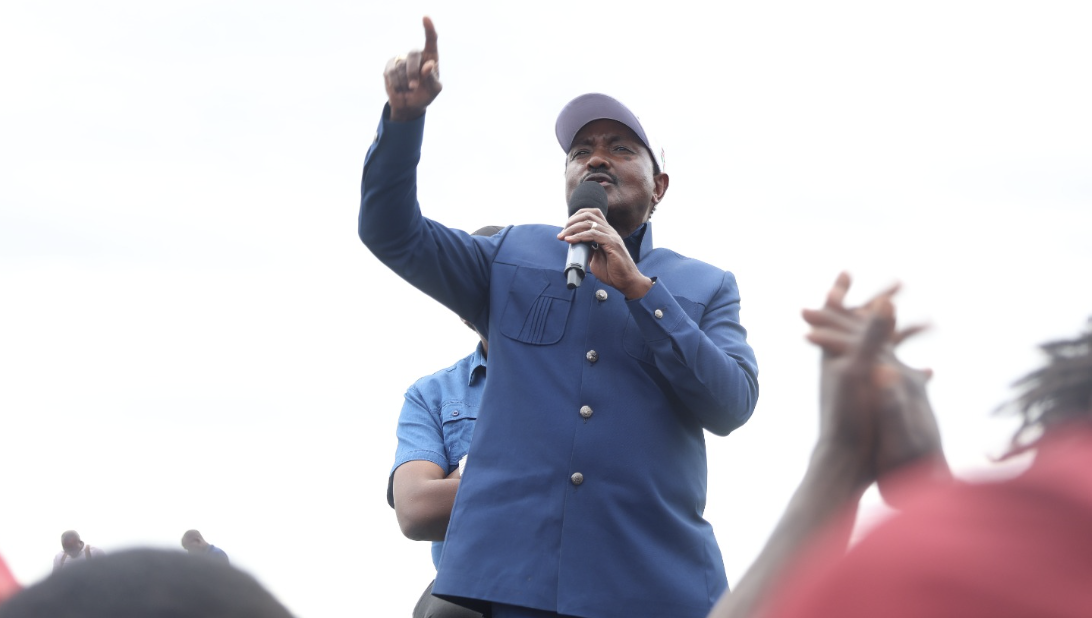
 Wiper Party leader Kalonzo Musyoka speaking during a rally in Makindu, Machakos county, June 6, 2025. /KALONZO MUSYOKA/X
Wiper Party leader Kalonzo Musyoka speaking during a rally in Makindu, Machakos county, June 6, 2025. /KALONZO MUSYOKA/XThe death of blogger and teacher Albert Ojwang in police custody continues to trigger a national firestorm, with political leaders, civil society, and citizens condemning what they describe as a chilling example of extrajudicial killing and a growing crackdown on dissent in Kenya.
Ojwang, a prominent digital commentator and teacher from Homa Bay county, was arrested at his home on June 7 over a social media post allegedly defaming Deputy Inspector General of Police Eliud Lagat.
He was transferred to Nairobi’s Central police station—a journey of nearly 400 kilometres—and died the following day while in custody.
Police initially claimed that Ojwang suffered injuries after striking his head against a wall, but an official postmortem examination confirmed that Ojwang died from blunt-force trauma to the head and neck compression, with additional injuries across his body.
In a strongly worded statement issued on Tuesday, June 10, Wiper Party leader Kalonzo Musyoka condemned the death as a "cruel execution" and blamed a government-aligned killer squad.
While condemning intimidation directed at influencers, Kalonzo demanded the immediate resignation of Deputy IG Eliud Lagat to facilitate transparent investigations into Ojwang's death.
“They clearly tortured and murdered Albert Ojwang,” Kalonzo said.
"To call for investigations is completely out of place. Langat - the Deputy Inspector General, should resign immediately."
Kalonzo's statement comes amid national outrage after pathologists revealed that Ojwang died not from self-inflicted injuries, as claimed by police.
"He was hit in the head and strangled," government pathologist Dr Bernard Midia said, noting that injuries to Ojwang’s hands strongly indicated an assault rather than self-harm.
ODM leader Raila Odinga demanded clarity on who authorised Ojwang's transfer to Nairobi, arguing that gravity and questions of institutional trust are at stake.
“Such deaths…seriously erode the authority and credibility of the police and the state, and that is a significant step towards chaos and collapse,” he said.
The digital creative community, represented by the Digital Content Creators Association of Kenya, described Ojwang as “a voice of the youth” whose death is “a grave violation of human rights”.
They said his death is an attempt to silence digital content creators through intimidation and fear.
"The Law Society of Kenya, Independent Policing Oversight Authority (Ipoa), Kenya National Commission on Human Rights (KNCHR), International Commission of Jurists (ICJ) Kenya, and Amnesty International have all called for an independent and expeditious probe into Ojwang’s death.
Several MPs have called on leaders to elevate the voices of civil society to demand a transparent inquiry.
Kalonzo said the United Opposition will issue a comprehensive statement on Wednesday on the extrajudicial killing of Ojwang, and the clampdown on digital space, including recent arbitrary arrests of Rose Njeri.
He described the arrest—allegedly linked to digital criticism—as part of psychological warfare aimed at silencing dissent.

















